Korean Testing Laboratory (KTL)
What is the Korea Testing Laboratory (KTL)
The Korea Testing Laboratory (KTL) is one of the three main testing laboratories and certification bodies in Korea. It was founded in 1966 with support from UNESCO as the Korea Fine Instrument Center (FIC).
In 1983, the name was changed to Korea Industrial Technology Center (KIMM) and in 1989, it was subordinated under the governmental research center Korea Institute of Industrial Technology (KAITECH).
The name was changed to KTL in 1999, and it was only in 2006 that KTL became an independent organization, not directly subordinated to a government organization. In 2015, the headquarters moved to the city of Jinju (Gyeongsangnam Province) in the south of Korea.

Responsibilities of the Korean Testing Laboratory’s
In addition to its main activity as a testing and certification body, KTL has set itself the following additional goals:
- Supporting the fourth industrial revolution through the development of standards and test platforms
- Promote safety for industry and consumers
- Support government-funded research projects to promote key Korean industries.
Like KTC and KTR, KTL can also issue KC certifications, which are mandatory for many product groups, and conduct the corresponding product tests.
Additionally, KTL can also process applications for KC’s certifications for explosion-proof electrical components, just like KGS and KOSHA.
KEMCO Certification
1. What is the KEMCO certification
The KEMCO certification was established was established to help controlling energy consumption in South Korea. It is a major factor in controlling emissions and setting the right incentives for improving energy efficiency.
The first energy efficiency program in Korea was set up in 1992 and targets products with a high energy consumption. Over the years, two additional programs have been introduced to target different products and areas. While one program only focuses on energy consumption during usage, there is also a dedicated program to reduce standby power in certain products.
Certification authority
The most important organizations for the energy efficiency regulations are the Ministry of Trade, Industry and Energy (MOTIE) and the Korea Energy Management Corporation (KEMCO).
The ministry is the main player for introducing energy efficiency policies and drafting respective regulations. The main policy for this has been the Rational Energy Utilization Act, which is divided into three different programs. The implementation and execution of these regulations and programs has been delegated by MOTIE to KEMCO.
2. Energy Efficiency Label and Standard Program (mandatory)
The most important one is the Energy Efficiency Label and Standard Program first introduced in 1992. This is a mandatory certification scheme that covers 35 product categories, including:
- Refrigerators
- Freezers
- Washing machines
- Dish washers
- TVs
- Electric motors
- Domestic gas boilers
- Electric fans
Normally, only already KC-certified products fall under this energy efficiency program. It requires product testing at designated national labs to determine the energy efficiency grades. The test report has to be provided to KEMCO, which makes it publicly available. Manufacturers then have to attach a label indicating the energy efficiency grade on their product.
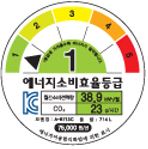
3. e-Standby Program (Mandatory)
This program is also a mandatory scheme that covers around 22 product categories and encourages a lower standby power consumption and the adoption of energy saving modes while products are idle.
Included products are for example:
- Computers
- Printers
- Scanners
- TVs
- Monitors
- Home audio products
- Servers
- Hand dryers
- Copiers
Testing in designated labs is required for a successful application with KEMCO.
The below label on the left can voluntarily be attached if products meet the required standards. However, products have to attach the warning label, should they fail to conform to the specified standby power standards.
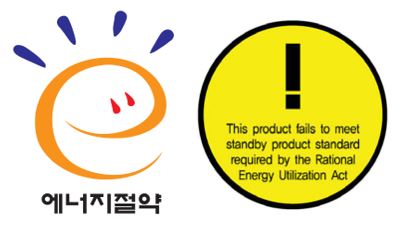
4. High-efficiency Appliance Certification Program (Voluntary)
This voluntary program covers roughly 44 products categories, mainly targeting appliances for industry or buildings. If they satisfy the energy efficiency standards set by the government, they can apply the respective label and may be eligible for financial support.
Products include:
- Lighting equipment
- Industrial gas boilers
- Inverters
- Centrifugal blowers
- Industrial oil boilers
- LED security light fixtures
- LED traffic lights
- Heat recovery ventilators
For receiving approval by KEMCO, applicants must submit application documents and a test report issued by a designated testing facility.
Once the KEMCO certification is approved, manufacturers can mark with the following label:
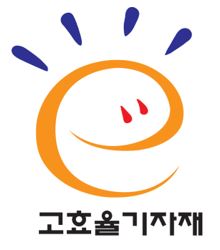
Common Topics:
- KC Mark certification: Product Groups
- KC Certification: Overview
- KCs Mark
- KCs for explosion proof products
- KC EMC Certification
Radio Research Agency (RRA)
What is the Korean Radio Research Agency (RRA)?
The Korean Radio Research Agency, or RRA for short, was founded in 1966 and has since been one of the main quality certification bodies for radio and communications equipment in Korea.
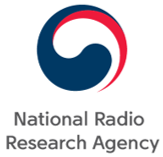
Responsibilities of the Korean Radio Research Agency (RRA)
As a government organization and research institute, the authority pursues various goals. These include, among other things:
- Certification, product testing and follow-up management of broadcasting and communication equipment
- Issuing technical criteria for radio and communication devices
- Research and development of radio wave resources
- Exploring the environment of radio waves and protection from them
- Prediction and warning of radio waves in space
- International registration of frequencies
The authority is therefore particularly relevant for KC-EMC certifications, which are mandatory for many electronic and communication devices.
Korean Testing Certification Institute (KTC)
What is the Korean Testing Certification Institute (KTC)
The Korean Testing Certification Institute (KTC) is one of the most important testing laboratories in Korea, headquartered in Gunpo, South Korea. Since its establishment in 2010, it has been working mainly in the three areas of product testing, certification, and R&D. The Korea Electrical Equipment Test Laboratory (KETI) as well as the Korea Machinery, Meter and Petrochemical Testing and Research Institute (MPI) are its further subordinates.
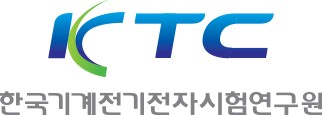
Responsibilities of the Korean Testing Certification Institute (KTC)
The stated goal of KTC is promoting the 4th industrial revolution. The institute focuses its activities on certain product groups, including:
- Electrical and Electronics
- Measuring instruments
- Chemical and Environmental Industries
- Bio and Medical Industries
- Information and Communication Technology
- Energy (esp., Renewable Energy)
In addition to ten locations in Korea, the KTC also has two branch offices in the People’s Republic of China. In addition, various Memorandums of Understanding have been concluded with institutions in Asia, North America and Europe.
KTC is often selected by the authorities as the responsible testing institution, especially for KC Certification and KC EMC Certification, which are mandatory for many product groups in Korea.
Korean Agency for Technology and Standards (KATS)
The Korean Agency for Technology and Standards (KATS) is the main body for drafting and promulgating standards in South Korea. It is part of the Ministry of Trade, Industry and Energy (MOTIE).
The agency is part of the most important international standards organizations, like the Organization for Standardization (ISO) and the International Electrotechnical Commission (IEC).
Initially founded in 1883, the Korean Agency for Technology and Standards started as the Analysis and Testing Laboratory for minerals. Only later on, it took up the functions around quality and consumer and industrial safety.
Korean Industrial Safety Standards
In 1999 it was positioned under the Ministry of Commerce, Industry and Energy (MOCIE) as the main standard setting body. The main functions are to develop the Korean Industrial Safety Standards (KS) to ensure safety and quality of consumer products and manage the certification of technology. This includes the development of standards relevant for the KC certification and KCs certification.
It was reorganized and streamlined in 2013, now under the Ministry of Trade, Industry and Energy (MOTIE). The agency now has 4 main departments:
- Bureau of Standards Policy
- Bureau of Product Safety
- Bureau of Conformity Policy
- Bureau of Technical Barriers to Trade (TBT) Affairs
In order to support the private-led development of standards, it has transferred more tasks for developing standards to the Cooperation Organization for Standards Development (COSD).
Other topics:
- KC Certification
- KCs Certification for machinery
- Korea Testing & Research Institute (KTR)
- Korea Occupational Safety & Health Agency (KOSHA)
- Korea Gas Safety Corporation (KGS)
Korea Testing & Research Institute (KTR)
The Korea Testing & Research Institute is one of the main accredited certification and testing bodies for KC certifications in Korea.
It was originally founded in 1969 as the Korea Rubber Products Testing and Inspection Institute.

KTR is an integrated testing and certification body recognized by the Korean government and the International Commission on the Rules for the Approval of Electrical Equipment (IECEE).
South Korea – International Product Certifications
Apart from national Korean certifications like KC and KS, KTR is also supporting Korean companies with international certifications through partnerships with other countries and institutes. Through that KTR can also perform certifications such as REACH, CE, EAC, JIS and PSE.
Additionally, KTR has 4 branches abroad in China, Vietnam, Germany and Mexico.
Product Tests in South Korea
KTR has several testing centers in Korea with it‘s headquarters and largest testing complex being located in Gwacheon.
Other branches have different specialities with the Yongin testing location focusing on electronic devices and batteries.
The Incheon branch specializes on materials and construction and the laboratory in Hwasun is specialized in medical devices and healthcare.
Apart from testing, KTR is also tasked to perform research duties and technical development in areas such as nanotechnology, chemicals and material science.
Furthermore, KTR also provides official trainings and performs failure cause analysis for enterprises in support of higher official Korean bodies like KOLAS (Korea Laboratory Accreditation Scheme) and KAS (Korea Accreditation System).
Other topics:
- KC Certification
- Korean Agency for Technology and Standards (KATS)
- Korea Occupational Safety & Health Agency (KOSHA)
- Korea Gas Safety Corporation (KGS)
Korea Occupational Safety & Health Agency (KOSHA)
The Korea Occupational Safety & Health Agency (KOSHA) is the main government organization for the protection of the health and safety of Korean workers. This also includes the the supervision of the KCs certification scheme for machines.
In the 1980s Korea established Occupational Health and Safety legislation that included the formation of KOSHA in 1987.
It’s primary goal is to protect workers health and safety and reduce occupational accidents as well as preventing industrial accidents.
Through accident prevention work in 1994 the rate of occupational accidents dropped under 1% for the first time.
Presently, KOSHA has about 1800 employees in 9 departments, 6 metropolitan offices, 10 regional branches and 11 area offices.
Certification of machines in Korea
One important function is the supervision and surveillance of dangerous machines through certification schemes. The most significant one is the KCs certification for machines, which KOSHA continually supervises and develops.
The authorities executing the KCs certification scheme under the guidance of KOSHA are for example Korea Gas Safety Corporation (KGS) and Korea Testing Laboratory (KTL). An important area here is the KCs certification of explosion-proof electrical components.
Apart from certifications and inspections of dangerous machines, KOSHA provides technical support for workers and helps with the development of accident-prevention technologies. Additionally, it supports especially small business in their safety efforts by providing training, risk assessments and technical support as well as providing funding to improve occupational safety.
Other topics:
- KCs Mark for machinery
- KCs Ex certification for explosion proof components
- Korea Testing & Research Institute (KTR)
- Korean Agency for Technology and Standards (KATS)
- Korea Gas Safety Corporation (KGS)
Korea Industrial Safety Association (KISA)
The Korea Industrial Safety Association (KISA) is an organization dedicated to promoting industrial safety and industrial accident prevention in South Korea. Established in 1964, KISA has a history of more than 50 years in promoting industrial safety culture and improving workplace safety standards in Korea.
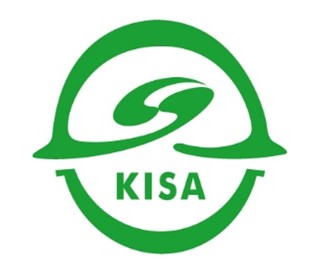
KISA’s primary goal is to enhance the safety of workers and prevent industrial accidents. To achieve this, KISA offers various training programs, certifications, and technical consulting services to companies and industries across different sectors. KISA also conducts research and provides information on industrial safety to improve safety policies and regulations. This has resulted in a reduction in workplace accidents and fatalities in Korea, making it one of the leading countries in terms of industrial safety.
KISA also offers certification services for safety equipment and products in accordance with the Industrial Safety and Health Act. The KCs Mark is a mandatory certification required for certain dangerous machinery and personal protective equipment. KISA is designated as an authorized organization that is allowed to issue this KC certification and it conducts various tests and evaluations to ensure that the products meet the safety and performance requirements for the KCs certification.
Differences between KISA and KOSHA
KISA and KOSHA (Korea Occupational Safety and Health Agency) are both organizations dedicated to promoting industrial safety and health in South Korea, but they have different roles and functions.
KOSHA is a government agency under the Ministry of Employment and Labor, responsible for developing and implementing national policies and regulations related to occupational safety and health. KOSHA can issue KCs certifications for the entire scope of machinery and products that require the KCs Mark.
While KOSHA focuses on occupational safety, KISA’s scope of business is wider, covering all aspects of industrial safety, including workplace safety, product safety, and environmental safety. KISA also provides KCs certification services, but only for a selection of machinery under the KCs scope. This includes cranes, lifts and aerial working platforms.
Korea Gas Safety Corporation (KGS)

This article primarily describes the KGS authority. For more detailed information on the KGS certification process, please see the KGS Factory Registration page.
KGS Korea
The Korea Gas Safety Corporation (KGS) is a governmental organization subordinated under the Ministry of Trade, Industry and Energy (MOTIE). Gas safety regulations in Korea started in 1974 with the enactment of the Compressed Gas Control Law. In 1995 the High-Pressure Gas Safety Institute was founded and after several reorganizations, in 2001 the Korea Gas Safety Corporation (KGS) was first established.
One year later KGS became affiliated with MOTIE. KGS was accredited as a Korean notified inspection body in 2003.
Its responsibilities and functions derive from different regulations relevant for the gas and high-pressure industry, namely the High-Pressure Gas Safety Management Law, the LP Gas Safety and Business Management Law, the City Gas Business Law and since 2020 also the Hydrogen Economy Promotion and Hydrogen Safety Management Act (Hydrogen Act).
Gas related regulations and laws in Korea
One very important function of KGS lies in the preparation of drafts for gas related regulations and laws.
Other main roles are in the area of certification of gas equipment and the inspection of gas equipment.
KGS carries out audits of gas facilities and petrochemical sites.
Furthermore, KGS also examines gas appliances, like gas boilers, and inspects pressure equipment manufacturers (cylinders, storage tanks and valves).
Certain products require high pressure and gas products require product certification, which is regulated by KGS.
For a detailed summary including relevant products and approval process, see the KGS Certification page.
Implementation of KCs certifications
KGS is also accredited to conduct KCs certifications and testing of explosion-proof electrical equipment.
In case of gas incidents, KGS is responsible for investigating, publishing reports and implementing prevention plans.
Additional prevention work consists of publicity campaigns around gas safety and the training of public servants and industry professionals on the newest methods and technologies for improving gas safety.
To that end, KGS also has a research and development center that is dedicated to the improvement pf gas safety through new technologies.



